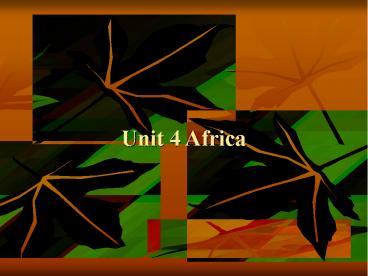Unit 4 Africa - PowerPoint PPT Presentation
Title:
Unit 4 Africa
Description:
Lowest point : The lowest point in Africa is Lake Assal, in Djibouti (in eastern Africa near the Horn of Africa); it is 512 feet (156 meters) below sea level. – PowerPoint PPT presentation
Number of Views:168
Avg rating:3.0/5.0
Title: Unit 4 Africa
1
Unit 4 Africa
2
Africa is the second-largest of the seven
continents on Earth (Asia is the largest
continent).
3
Africa is bound by the Atlantic Ocean on the
west, the Indian Ocean on the east, the
Mediterranean Sea on the north, and the Red Sea
on the northeast.
4
Africa covers 11,700,000 square miles (30,300,000
square kilometers).
5
Countries There are about 53 countries in Africa
(some countries are disputed).
6
The largest country in Africa is Sudan, which
covers 967,500 square miles (2,505,816 square
kilometers).
7
The countries with the largest populations in
Africa are Nigeria (107,000,000 people), Egypt
(64,800,000 people), and Ethiopia (58,700,000
people).
8
Highest Point The tallest point in Africa is Mt.
Kilimanjaro, in Tanzania (eastern Africa). Mt.
Kilimanjaro is 19,340 feet (5895 meters) tall.
Africa has no long mountain chains.
9
Lowest point The lowest point in Africa is Lake
Assal, in Djibouti (in eastern Africa near the
Horn of Africa) it is 512 feet (156 meters)
below sea level.
10
Lakes Africa's largest lake is Lake Victoria it
covers 26,836 square miles (69,500 square
kilometers). Other large lakes in Africa are Lake
Tanganyika, Lake Malawi, and Lake Chad.
11
Rivers The longest river in Africa is the Nile
River it is 4,241 miles (6825 kilometers) long.
Other long rivers in Africa include the Congo
River, the Niger River and the Zambezi River.
12
Deserts Africa has many vast deserts, including
the largest hot desert in the world, the Sahara.
13
The Sahara Desert is located in northern Africa
and covers 3,500,000 square miles (9,065,000
square kilometers).
14
The Kalahari desert, in southern Africa, is
another large desert.
15
Islands The largest island off Africa is
Madagascar, which is near the coast of southeast
Africa. Equatorial Guinea (off the coast of
Cameroon), and Sao Tome (southwest of Equatorial
Guinea).
16
Madagascar covers 226,658 square miles (587,000
square kilometers).
17
North Africa
18
Five ( 5 ) countries make up North Africa
Algeria, Libya, Morocco, Tunisia, and Egypt
19
Architecture is a contemporary expression of
culture that is influenced by the past.
20
As a result of the Muslim conquest during Middle
ages, all of the countries in North Africa are
Islamic.
21
Most of the population of the North African
region are near water. Mainly near the
Mediterranean Sea.
22
The climate in North Africa plays a very
important role. The climate makes this region (
North Africa ) a place where people want to live.
23
Most North African countries are considered to be
developing countries. Developing countries are
countries that are becoming more and more
modernized.
24
North Africa has several limited natural
resources such as oil, phosphate rock, and
natural gas.
25
The North African region is similar to the Middle
East in many ways. The most common
characteristic would be the Muslim faith.
26
Europe and Southwest Asia have both had a big
influence in the cultural development of North
Africa.
27
Other cultures in North Africa are Berber,
Nomadic, and Arabic.
28
North Africa has a rich heritage and artistic
expression. Some examples of artistic expression
would be designs in glassware, mosques with
beautiful domes, and painted and dyed cloth.
29
Alexander brought Greek culture to Egypt.
30
Most of Egypts population is located in a narrow
band that runs from north to south because
people migrate toward water. They migrate
toward the Nile river, which is the longest river
in the world.
31
Today Egypt is ruled by a president. In the past
ancient Egypt was ruled by a pharoah.
32
All of the countries in North Africa are a
republic, except Libya and Morocco. Libya has a
dictatorship. Morocco has a constitutional
monarchy.
33
(No Transcript)































